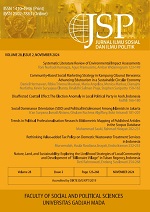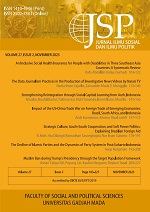The Practice of Political Entrepreneurship in a Rural Javanese Village
Wawan Sobari(1*)
(1) (SCOPUS ID= 57105777400), Master Program of Social Science, Universitas Brawijaya
(*) Corresponding Author
Abstract
This qualitative case study aims to explore the practice of political entrepreneurship in a rural Javanese village. Political entrepreneurship is dictated by the special interest of political entrepreneurs, incentives gained from the political system, and awareness about targeting the change of political institution, an explanation theorized by McCaffrey and Salerno (2011). Unlike the theory, this study assesses the importance of cultural explanation of political entrepreneurship which provides room in an academic discussion. The study reveals the role of Javanese (and Islam) values in encouraging the political entrepreneurship of a village head. Philosophical values of Javanese leadership promoting an exemplary leader (ing ngarso sung tulodo) and leadership behavior that is andap asor (humble) have favored public acceptance of the practice of political entrepreneurship. Furthermore, the doctrine (akhlak) and practices of Islamic rituals by the village head explain the direction of political entrepreneurship. This study discovers also the concept of ‘sungkan’ demonstrated in respect for the performance of the village head. Moreover, the ability to provide solutions to villagers’ problems practiced through suwuk and petungan add gratitude for the village head. Leadership behavior adhering to these cultural and religious values directly or indirectly induced a ‘sungkan’ effect in a reelection bid (the 2013 Village Election). ‘Sungkan’, which is equal to electoral accountability, explicates the outcome of political entrepreneurship for the electoral process in the village that were relatively clean from vote-buying. Lastly, the casework expands political entrepreneurship theory, indeed, cultural and religious values can also drive the practice of political entrepreneurship.
Keywords
Full Text:
PDFReferences
Bitetto, D. M., Gilardoni, G., & D’Anselmi, P. (2013). Separating the Useful from the Beautiful. In M. Bitetto, G. Gilardoni, & D. Paolo (Eds.), SMEs as the Unknown Stakeholder (pp. 153-176). London: Palgrave Macmillan.
Christopoulos, D., & Ingold, K. (2011). Distinguishing betw een political brokerage & political entrepreneurship. Procedia-Social and Behavioral Sciences, 10 (2011), 36-42. doi: 10.1016/j.sbspro.2011.01.006
Creswell, J. W . (2009) Research design: Qualitative, quantitative, and mixed methods approaches. Thousand Oaks, California: Sage Publications.
DiLorenzo, T. J. (1988). Competition and political entrepreneurship: Austrian insights into public-choice theory. The Review of Austrian Economics, 2(1), 59-71. doi: 10.1007/BF01539298
Frinaldi, A., & Embi, M. A. (2014). Budaya kerja ewuh pakewuh di kalangan Pegawai Negeri Sipil Etnik Jawa (Studi pada Kabupaten Pasaman Barat, Provinsi Sumatera Barat). Humanus, 13(1), 68-75. doi: 10.24036/jh.v13i1.4099
Geertz, C. (1960). The Religion of Java. Chicago and London: The University of Chicago Press.
Geertz, H. (1961). The Javanese Family. USA: Free Press of Glencoe.
Gordon, R., & Stenvoll, T. (2007). Statoil: A study in political entrepreneurship. Paper presented at The Changing Role of National Oil Companies in International Energy Markets, Japan.
Gunawan, Y. (2016, November 7). Melestarikan budaya srawung. Unika. Retrieved from http://news.unika.ac.id/2016/11/ melestarikan-budaya-srawung/
Hogan, J. (2006). The contribution of political entrepreneurs to policy change at times of crisis. Financial Times, 15.
Holcombe, R. G. (2002). Political entrepreneurship and the democratic allocation of economic resources. The Review of Austrian Economics, 15(2-3), 143-159. doi: 10.1023/A:1015758419984
Kalimullah, M. (2016). Primbon dalam budaya Jawa: Studi tekstual-komprehensif kitab Betaljemur Adammakna dan aplikasinya dalam masyarakat (Doctoral dissertation, UIN Surabay a, 2016). Surabay a. Indonesia: UIN Surabaya.
Koentjaraningrat. (1990). Javanese culture. Singapore: Oxford University Press.
Kutanegara, P. M. (2002). Peran dan makna sumbangan dalam masyarakat pedesaan Jawa. Populasi, 13(2). 41-59. doi: 10.22146/ jp.11827
Martin, A., & Thomas, D. (2013). Two-tiered political entrepreneurship and the congressional committee system. Public Choice, 154(1-2), 21-37. doi: 10.1007/ s11127-011-9805-z
McCaffrey, M., & Salerno, J. T. (2011). A theory of political entrepreneurship. Modern Economy, 2(4), 552-560. doi:10.4236/ me.2011.24061
Pappas, T. S., & Assimakopoulou, Z. (2012). Party patronage in Greece: Political entrepreneurship in a party patronage democracy. In P. Kopecky, P. Mair, M. Spirova (Eds.). Party patronage and party governments in European democracies (pp.144-162). Oxford: Scholarship Online.
Richelson, J. (1973). A note on collective goods and the theory of political entrepreneurship. Public Choice, 16(1), 73-75. doi: 10.1007/BF01718808
Roberts, N. C., & King, P. J. (1991). Policy entrepreneurs: Their activity structure and function in the policy process. Journal of Public Administration Research and Theory , 1 (2), 147-175. doi : 10.1093/ oxfordjournals.jpart.a037081
Rosmiati, A. (2014). Teknik stimulasi dalam pendidikan karakter anak usia dini melalui lirik lagu dolanan. Resital: Jurnal Seni Pertunjukan, 15(1), 71-82. doi: 10.24821/resital.v15i1.801
Shockley, G., Frank, P., & Stough, R. (2002, March). Toward a theory of public sector entrepreneurship. Paper presented at The NCIIA 7th Annual Meeting: Big Ideas of The Small World, Boston.
Sobari, W. (2017). Patronage driven democracy: Emerging local politics in the Post-Soeharto Indonesia. Surabaya: Airlangga University Press.
Stake, R. E. (1994). Qualitative case studies. In N. Denzin & Y. S. Lincoln (Eds.). Handbook of Qualitative Research (pp. 134-164). California: Sage publications, Inc.
Sudardi, B. (2002). Konsep pengobatan tradisional menurut primbon Jawa. Humaniora , 14 (1), 12-19. doi: 10.22146/jh.v14i1.740
Sudardi, B. (2015). Ritual dan nilai islami dalam folklor Jawa. Ibda’, 13(2), 112-122. doi: 10.24090/IBDA.V1312.665
Sutarto, A., & Sudikan, S. Y. (2008). Pemetaan kebudayaan Propinsi Jawa Timur: Sebuah upaya pencarian nilai-nilai positif. Jember: Biro Mental Propinsi dan Kompawisda Jatim.
Yana, M. H. (2012). Falsafah dan pandangan hidup orang Jawa. Yogyakarta: Bintang Cemerlang.
Article Metrics
Refbacks
- There are currently no refbacks.
Copyright (c) 2019 Jurnal Ilmu Sosial dan Ilmu Politik

This work is licensed under a Creative Commons Attribution-NonCommercial-NoDerivatives 4.0 International License.























